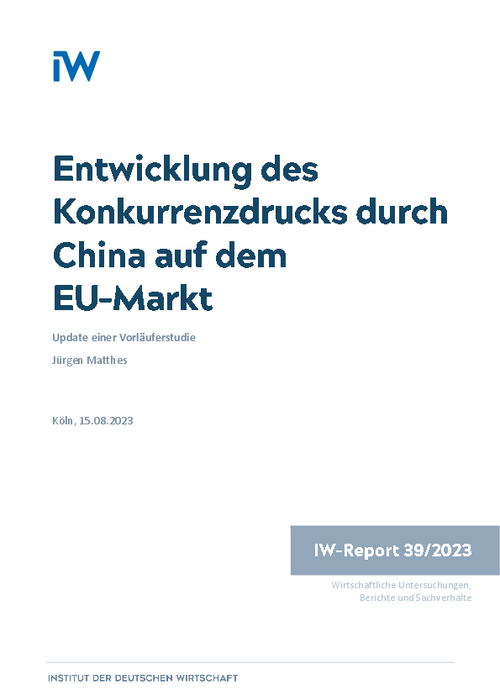This report examines whether China's exports are increasingly penetrating those sectors in which the German economy has its strengths. To investigate this question, the changes in China's and Germany's shares of EU imports are analysed descriptively over the period 2000 to 2022.

Development of the Competitive pressure from China on the EU market

This report examines whether China's exports are increasingly penetrating those sectors in which the German economy has its strengths. To investigate this question, the changes in China's and Germany's shares of EU imports are analysed descriptively over the period 2000 to 2022.
First, aggregate merchandise imports and total imports of sophisticated industrial goods, in which the German economy specialises, are considered. In a second step, EU imports of sophisticated industrial goods are analysed in more detail at the 2-digit product level. Finally, 4-digit product groups are considered, focusing on the most important groups from the German perspective. The results in these different perspectives are similar:
- China's share of EU imports has risen very significantly and continuously. Initially, this applied mainly to the first decade of the period under review and less to the second decade, as a previous study with data up to 2019 showed. This update comes to the remarkable conclusion that the momentum of China's share increases has significantly risen again since 2020. In many of the aspects analysed, China has expanded its share of EU imports in the two years between 2020 and 2022 alone by about as much, and in some cases even more, than in the entire previous ten-year period. This is particularly true for sophisticated industrial goods, in which Germany has specialised up to now.
- Germany's share of EU imports has been declining overall and in numerous sophisticated industrial pro-duct groups since 2005. This decline has recently accelerated in many areas.
Chinese share gains and German share losses often go hand in hand in many perspectives. Although no causality is examined in this report, this finding strongly suggests that China is increasingly competing with the German economy in its EU home market and in sectors where it has been traditionally strong. The problem is that China's export successes are likely also based on extensive and widespread subsidies, which raises the question of trade policy responses.
The empirical findings raise concerns in view of the energy transition challenges and the fundamental competitiveness problems in Germany. In the automotive industry, which is an important pillar of Germany's export success, the energy transition is likely to further intensify the problematic development outlined above. China is in the process of conquering the European market for electric vehicles, albeit from a small base. In the chemical industry, it is questionable how the energy-intensive chemical firms will be able to defend their economically relevant export successes with such high energy costs, considering that China is also gaining ground here. And even the highly specialised mechanical engineering sector, which tends to profit from the energy transition, is losing its supremacy to Chinese competitors in more and more subsectors. In all these sectors, Germany's lead over China in the EU market is increasingly shrinking. In the electrical industry, China has overtaken Germany in terms of EU import shares for some time already. Overall, the German industrial export model seems to be tottering.

Development of the Competitive pressure from China on the EU market

More on the topic

Competitive pressure from China for German companies
A firm survey conducted in March/April 2024 as part of the IW-Zukunftspanel among around 900 German companies from the manufacturing and industrial services sectors shows that around 350 of the companies surveyed have Chinese competitors in their markets.
IW
Strategic autonomy and economic security achieve efficiently
In this study an analytical scheme is developed to operationalise the objective of strategic autonomy in a cost-effective way.
IW